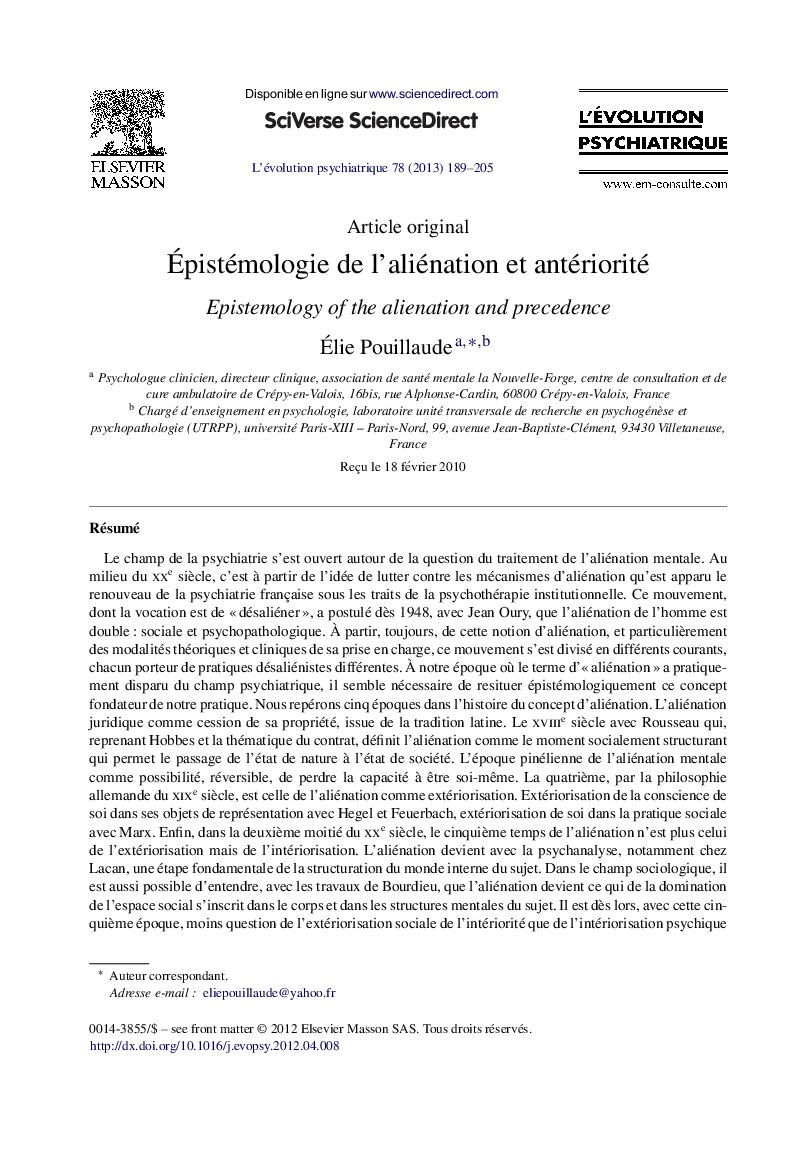| کد مقاله | کد نشریه | سال انتشار | مقاله انگلیسی | نسخه تمام متن |
|---|---|---|---|---|
| 908638 | 917189 | 2013 | 17 صفحه PDF | دانلود رایگان |

RésuméLe champ de la psychiatrie s’est ouvert autour de la question du traitement de l’aliénation mentale. Au milieu du xxe siècle, c’est à partir de l’idée de lutter contre les mécanismes d’aliénation qu’est apparu le renouveau de la psychiatrie française sous les traits de la psychothérapie institutionnelle. Ce mouvement, dont la vocation est de « désaliéner », a postulé dès 1948, avec Jean Oury, que l’aliénation de l’homme est double : sociale et psychopathologique. À partir, toujours, de cette notion d’aliénation, et particulièrement des modalités théoriques et cliniques de sa prise en charge, ce mouvement s’est divisé en différents courants, chacun porteur de pratiques désaliénistes différentes. À notre époque où le terme d’« aliénation » a pratiquement disparu du champ psychiatrique, il semble nécessaire de resituer épistémologiquement ce concept fondateur de notre pratique. Nous repérons cinq époques dans l’histoire du concept d’aliénation. L’aliénation juridique comme cession de sa propriété, issue de la tradition latine. Le xviiie siècle avec Rousseau qui, reprenant Hobbes et la thématique du contrat, définit l’aliénation comme le moment socialement structurant qui permet le passage de l’état de nature à l’état de société. L’époque pinélienne de l’aliénation mentale comme possibilité, réversible, de perdre la capacité à être soi-même. La quatrième, par la philosophie allemande du xixe siècle, est celle de l’aliénation comme extériorisation. Extériorisation de la conscience de soi dans ses objets de représentation avec Hegel et Feuerbach, extériorisation de soi dans la pratique sociale avec Marx. Enfin, dans la deuxième moitié du xxe siècle, le cinquième temps de l’aliénation n’est plus celui de l’extériorisation mais de l’intériorisation. L’aliénation devient avec la psychanalyse, notamment chez Lacan, une étape fondamentale de la structuration du monde interne du sujet. Dans le champ sociologique, il est aussi possible d’entendre, avec les travaux de Bourdieu, que l’aliénation devient ce qui de la domination de l’espace social s’inscrit dans le corps et dans les structures mentales du sujet. Il est dès lors, avec cette cinquième époque, moins question de l’extériorisation sociale de l’intériorité que de l’intériorisation psychique de l’extériorité. Nous verrons, pour conclure, que sous les traits de la dialectique du Dehors et du Dedans, cette construction de l’intériorité par l’enfermement de l’extériorité introduit la dimension de l’antériorité dans le psychisme.
The field of psychiatry is becoming aware of the issues surrounding the treatment of what is known in French as l’aliénation mentale – insanity or mental alienation. In the middle of the 20th century, the idea of combating the mechanisms of insanity led to a revival of French psychiatry in the form of institutional psychotherapy. In 1948, this movement led by Jean Oury, whose intention was to “disalienate”, postulated that there are two forms of insanity: social alienation and psychopathological alienation. Still using this idea of insanity, and especially the theoretical and clinical methods of treating it, this movement divided into various strands, each using different cures. Currently when the term “mental alienation” has practically disappeared from psychiatry, it seems necessary to deal with the meaning behind the semantics of this founding concept of our practice. We can identify five stages in the development of the French word “aliénation” (alienation or insanity). Its legal meaning, which derives from Latin, is the transfer of property. In the 18th century, Rousseau, basing his ideas on Hobbes's work on the social contract, defined aliénation as the socially structuring moment that led to the movement from the state of nature to a social state. The third stage in the 18th century was when Philippe Pinel defined aliénation as a reversible possibility, as losing the ability to be oneself. The fourth, based on 19th century German philosophy, defines aliénation as externalisation – externalisation of self-awareness in a representational system as put forward by Hegel and Feuerbach and externalisation of self in social practice as put forward by Marx. Finally, in the second half of the 20th century, the fifth stage in aliénation is no longer externalisation but internalisation. With psychoanalysis, especially according to Lacan, aliénation becomes a fundamental stage in the subject's construction of the internal world. And in Bourdieu's work in the sociological field, we are told that aliénation means what the domination of the social space registers in the body and in the subject's mental structures. This fifth stage thus makes it less a question of the social externalisation of the inner life than of mental internalisation of the external. In conclusion, we will see that, presented as a dialectic of the Outside and the Inside, this construction of the inner life, by enclosing the outer world, introduces the dimension of precedence in the development of the mind.
Journal: L'Évolution Psychiatrique - Volume 78, Issue 2, April–June 2013, Pages 189–205